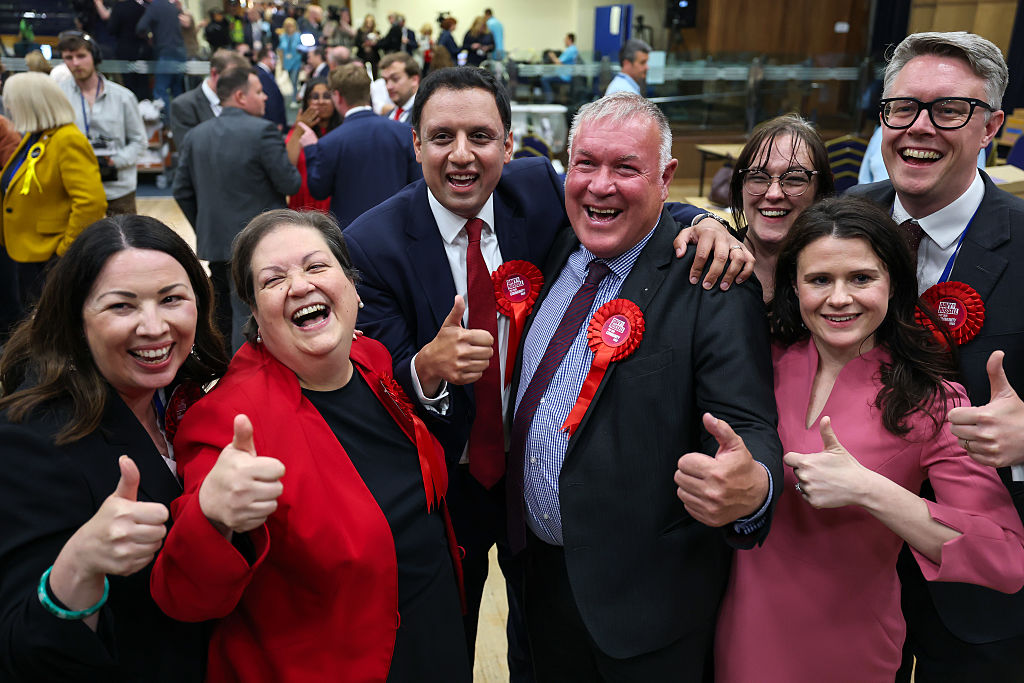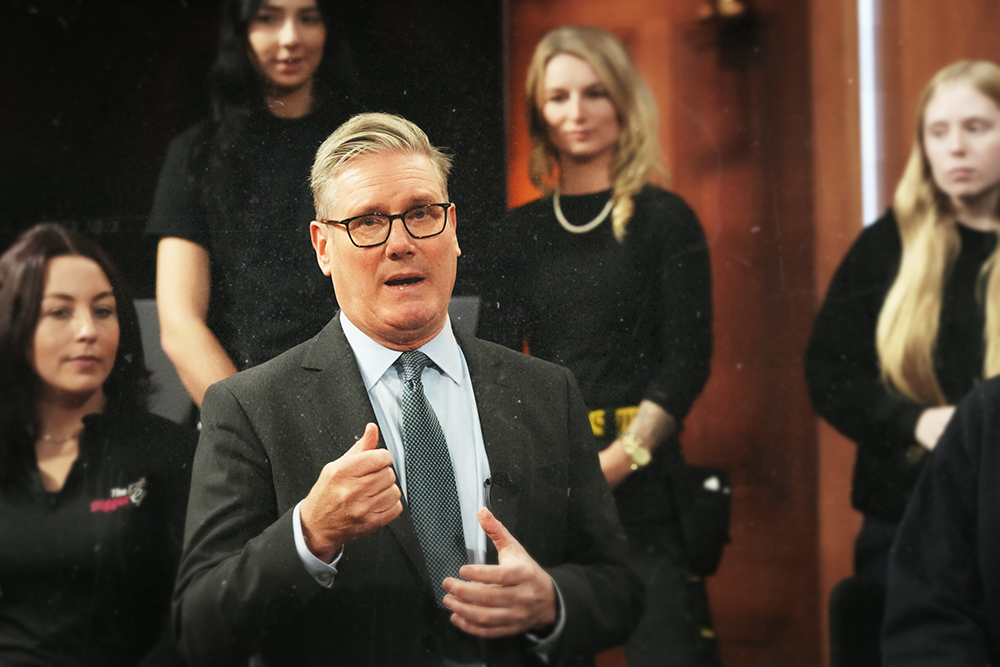In the early hours of this morning, Scottish Labour won the Hamilton, Larkhall and Stonehouse by-election in a three-way contest that turned out to be even tighter than expected. Local candidate Davy Russell clinched victory in a seat that the SNP has held for 14 years – despite running a media-shy campaign that saw him duck out of election debates and widely mocked for his discomfort on camera. But while Labour politicians insist this unexpected win shows they’re back on top – party leader Anas Sarwar even claimed he now ‘expected’ to win the 2026 Holyrood election – the numbers tell a slightly different story.
Hamilton’s by-elections have proven to be metaphors for political upheaval, and this time it is Reform’s breakthrough that is noteworthy.
Labour’s narrow victory – with 8,559 votes and a majority of 602 – saw Sarwar’s party backed by 31 per cent of voters, but its vote share was down and Reform UK was hot on its heels. And it was a bad night for the SNP, which was expected to hold the seat but took less than 30 per cent of the vote – down almost 17 points on its last performance here. Ultimately, Reform UK had the best night in relative terms: senior party figures confided in the hours leading up to the result that they’d count taking 20 per cent of the vote as a good effort. In fact, the insurgent group – which its leader Nigel Farage has confessed hasn’t had all that much resource directed at it – came away on 26 per cent, better than where it is polling north of the border, and just 500 votes off Scotland’s party of government. 11 months out from the next Scottish parliament elections, today’s result suggests that both Labour and the SNP need to get more serious about the Reform threat.
Hamilton has an interesting political history attached to it. In 1967 it was where the SNP's Winnie Ewing emerged victorious, marking the start of a nationalist revolution. Just under two years ago, Labour's Michael Shanks won the Westminster constituency with a 20 per cent swing from the SNP to Labour, with the area seen as a bellwether for how Scots would approach the 2024 election. As predicted, there followed a Labour landslide during that general election. How South Lanarkshire votes is remarkably reflective of where the rest of Scotland is – with the area backing 'No' by 55 per cent in 2014 and 'Remain' by 63 per cent in 2016. This doesn't mean today's result suggests Scottish Labour will sweep to victory next year. But its by-elections have proven to be metaphors for political upheaval, and this time it is Reform's breakthrough that is noteworthy.
Scotland’s political parties each ran short campaigns after the tragic death of the area’s incumbent MSP, the SNP’s Christina McKelvie, in March this year. Having only weeks until polling day to convince voters to back them, activists combed the constituency while their party leaders held frequent pressers. Reform sources admit they felt they had started out on the back foot, given they didn't have the same numbers of elected representatives that the other parties had, with the insurgent group having to rely on volunteers bussing in from elsewhere to canvass. But conversations on the doorsteps weren’t as encouraging as Scotland’s mainstream parties might have hoped, with SNP, Labour and Conservative campaigners quick to realise that in this area they faced two main issues: apathy and anger.
And so if there was one word to describe the mood among Hamilton’s constituents, it would be ‘scunnered’. There’s a sense of injustice that runs deep in the area: it has a rich mining history and was once a Labour heartland, but the constituency has its fair share of deprivation and its hard-working residents feel they’ve been let down by successive governments both north and south of the border. Voters from across the political spectrum feel disillusioned by the UK’s traditional parties and politics in general – and there is a growing distrust in politicians. This isn’t new: at the July election, Britons backed Labour after the party ran a successful ‘change’ campaign. But voter patience is wearing thinner faster than before and the Labour government has burnt through much of it with its poorly communicated winter fuel payment cuts and changes to disability payments. Now Farage’s party is offering its own message of change and voters desperate for any kind of optimism are being drawn in – even in Scotland, where until now it wasn’t all that clear just how effective Reform’s operation was.
Despite deputy party leader Richard Tice’s assertion that the contest was a ‘two-horse race’ between the SNP and Reform – a claim that was quickly echoed by the SNP in a bid to pull voters away from Labour – throughout the campaign, most pollsters expected the victory to be a close call between the party of government and Sarwar’s crowd. Yet when Labour's candidate was prevented from doing media appearances (most notably refusing to come into the STV studio for the debate earlier this week) there was concern that this might be his 1988 Govan by-election moment. That despite Labour’s claim to the constituency – particularly given the appetite for ‘change’ on the backdrop of the SNP being in Holyrood for almost two decades – Russell’s communication failures would prove true the SNP and Reform propaganda, that Labour was not competitive here.
This didn't turn out to be the case. But while today’s result is a win for its activists’ ground campaign and proves the party’s insistence that selecting a locally-known figure works, celebrations for Sarwar’s party should be short-lived. His UK counterparts have done him no favours ahead of the 2026 poll, with Sir Keir Starmer’s U-turns regularly cited while policies such as the winter fuel payment cuts and the two-child benefit cap remain unpopular. Russell himself became rather red-faced when quizzed by STV’s Colin Mackay about whether he agreed with Starmer’s decision to cut the fuel benefit for pensioners, while senior Scottish Labour figures privately fume at how their London colleagues have botched communications over the last year. Scottish Labour hasn’t quite figured out how to distinguish itself from the UK-wide party in a way that makes sense to Scottish voters and continues to poll around 10 to 15 points behind the SNP. In essence, Scottish Labour got lucky in this by-election: they won in spite of Starmer.
And while the SNP is on its way to something of a recovery in the polls (following, of course, the tumultuous leadership of Humza Yousaf and the police probe that saw Nicola Sturgeon’s house raided and her husband charged with fraud) today’s result is a stark reminder that the party has a way to go to rebuild trust with its supporters. Senior figures have expressed anger at the nationalists’ approach to this contest, infuriated by the ‘SNP v Reform’ rhetoric which they rightly claim gives the insurgent party more credibility while preventing the nationalists from running a more positive campaign.
As I wrote last week, the most interesting feature of this election would be where Reform places – and by how much it would cut into both the SNP and Labour vote. This morning has shown that both Labour and the nationalists – however ‘immune’ the latter believe they are to Farage’s tartan bounce – need to take the Reform threat much more seriously.








Comments